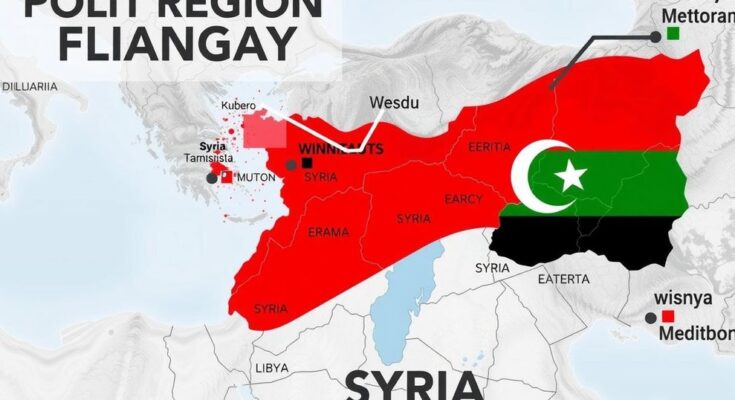Bashar al-Assad’s ousting in Syria has intensively impacted Libya, with Russia redirecting military assets towards supporting Khalifa Haftar’s forces. As Assad officials reportedly flee to Libya, the potential for increased Russian influence in the region raises alarms. The complex interplay of illicit business and military alliances between the two nations continues to evolve amidst ongoing foreign interventions, prompting concerns over future regional stability.
The recent ousting of Syrian President Bashar al-Assad has initiated significant geopolitical ramifications, particularly influencing the landscape in Libya. The rapid influx of Assad regime officials into Libya, specifically to Benghazi, signals that Russia is pivoting its military assets towards this North African nation as it reassesses its presence in Syria. Reports indicate an increase in air and naval traffic between Syria and Libya and a transfer of military resources from Russia’s airbase in Syria to facilities in Libya.
The implications of this shift are manifold. In Libya, commander Khalifa Haftar, who controls a significant eastern segment of the country, stands to gain from Russia’s renewed focus. As sources suggest, Russia might exert greater pressure on Haftar to secure a strategic port in Benghazi, further consolidating Russia’s influence in the region, which is strategically situated between Europe, the Middle East, and Africa.
The historical context reveals a link between the Assad regime and Haftar’s forces, with both benefitting from a common ideology of authoritarian governance and networks of illicit trade. Furthermore, the ties between the two regimes extend into human and drug trafficking, where Cham Wings, a Syrian airline, has allegedly facilitated these operations between Syria and Libya.
Despite overwhelming evidence of Haftar’s connections to Russian interests, Western powers, including the United States, have continued to engage with him, seemingly underestimating the implications of his alignment with Moscow. The presence of foreign actors complicates the scenario, as Turkey backs the Tripoli administration, countering Haftar’s advancing coalition.
As military assets shift from Syria to Libya, analysts predict these developments could exacerbate conflicts in other regions, particularly in Africa, where the weapons and resources may spill over into active combat zones.
Overall, the fallout from Assad’s removal is reshaping alliances and military strategies across the Mediterranean, creating a precarious situation that demands careful attention from international stakeholders.
The article discusses the geopolitical consequences following the ousting of Bashar al-Assad in Syria, particularly how it affects Libya. With the diminishment of Russian military strength in Syria, the article posits that Russia is redirecting its focus and resources towards Libya, potentially strengthening the position of Khalifa Haftar, a key player in the Libyan conflict. The context of the Syrian Civil War and the historical ties between militarized regimes in both countries underscore the significance of this transition.
The article illustrates how the fall of Assad has set off a complex web of geopolitical shifts, leading to renewed Russian interests in Libya, which could strengthen Khalifa Haftar’s position in the region. The implications for regional dynamics are substantial, particularly concerning the potential escalation of conflicts and the entrenchment of illicit trade networks. As foreign influences continue to reshape Libya’s landscape, careful international deliberation is necessary to mitigate further conflict.
Original Source: www.france24.com




